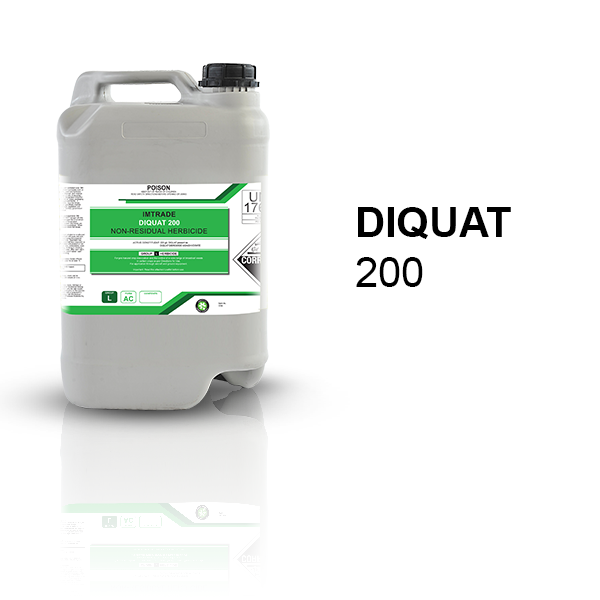Diquat Herbicide Vs Glyphosate
Diquat Herbicide vs Glyphosate: Which One is the Best for Weed Control?
Introduction
If you're an avid gardener or farmer, you're probably no stranger to herbicides and their importance in controlling weeds and maintaining healthy crops. When it comes to herbicides, diquat and glyphosate are two of the most widely used chemicals in the market. But which one is the better option? In this article, we'll take a closer look at diquat herbicide vs glyphosate and compare their strengths and weaknesses
Pain Points
If you're having trouble with weeds taking over your garden, you might be looking for a quick and easy solution to get rid of them. However, using the wrong herbicide can be detrimental to your crops and the environment. In addition, different herbicides work better for certain types of weeds and vegetation, and this can cause confusion when choosing one that is appropriate for your situation.
Answering the Target
Diquat herbicide and glyphosate are both effective in controlling weeds, but they work in different ways. Glyphosate is a broad-spectrum herbicide that targets the enzyme that is essential to plant growth, eventually killing the plant. It's non-selective, meaning it will kill any plant it comes into contact with. On the other hand, diquat targets the cell membranes of plant cells, causing them to break down quickly. This makes it particularly effective for controlling aquatic weeds and grasses.
Summary of Main Points
In summary, both diquat herbicide and glyphosate have their advantages and disadvantages, depending on the task at hand. While glyphosate is a more widely used herbicide for general weed control, diquat may be a better option for aquatic weeds and grasses. It is important to choose an herbicide that is best suited for the specific type of weed you are trying to control.
Diquat Herbicide vs Glyphosate Target 1
When it comes to controlling weeds in a pond or other aquatic environment, diquat herbicide is the go-to solution for most farmers and gardeners. It is effective in controlling common aquatic weeds such as milfoil, water hyacinth, and duckweed. The main advantage of using diquat is that it is a contact herbicide, which means it only affects the plant tissue it comes into contact with. This makes it an effective option for spot treatment and controlling specific weeds.

Diquat Herbicide vs Glyphosate Target 2
Glyphosate is a versatile herbicide that is effective in controlling a broad range of weeds, including grasses and broadleaf weeds. It's non-selective, meaning it will kill any plant that it comes into contact with. It's particularly effective for controlling weeds in large areas such as fields and lawns. However, using glyphosate requires care and attention, as it can be harmful to non-target plants and can even kill desired vegetation if not properly applied.

Diquat Herbicide vs Glyphosate in Detail
Diquat is a fast-acting herbicide that can control weeds quickly and effectively. It's a contact herbicide, meaning it only affects the plants that it comes into contact with. It's particularly effective for controlling aquatic weeds, such as water hyacinth and milfoil, and is often used in aquatic environments. Glyphosate, on the other hand, is a broad-spectrum herbicide that targets a specific enzyme in plant cells and kills the plant over a longer period of time. Glyphosate is often used for field crops, turf management, and other large-scale weed control operations.

Diquat Herbicide vs Glyphosate: Side Effects
Both diquat and glyphosate can be harmful to the environment if not used properly. Diquat can be toxic if ingested or absorbed through the skin. It's important to wear protective clothing when handling diquat, and to follow all instructions on the label. Glyphosate can also be harmful if ingested or inhaled and can have long-term effects on the environment if not properly administered. It's important to take extra care when using glyphosate in areas where there are non-target plants and vegetation.
Question and Answer
1. What is the difference between diquat herbicide and glyphosate?
Answer: Diquat is a contact herbicide that targets the cell membranes of plant cells, while glyphosate is a broad-spectrum herbicide that targets a specific enzyme in plant cells and kills the plant over a longer period of time.
2. Can diquat herbicide be used on crops?
Answer: Diquat is not suitable for use on crops as it is a contact herbicide and may damage crops.
3. Is glyphosate safe to use around pets and children?
Answer: Glyphosate can be toxic if ingested or inhaled, and it's important to keep pets and children away from areas where it has been applied.
4. What is the main advantage of diquat herbicide?
Answer: The main advantage of diquat is that it is a contact herbicide, meaning it only affects the plant tissue it comes into contact with.
Conclusion
In conclusion, choosing the right herbicide for your specific needs is essential to effective weed control and maintaining a healthy environment. While diquat herbicide and glyphosate are popular herbicides, their effectiveness depends on the type of weed and vegetation you need to control. Make sure to follow all instructions carefully when using herbicides and take appropriate precautions to avoid harming non-target plants and animals.
Gallery
Diquat Water Weed And Landscape Herbicide Fast, Free Shipping

Photo Credit by: bing.com / diquat herbicide water weed landscape aquatic herbicides
Diquat Non-Residual Herbicide (Diquat) | Specialist Sales

Photo Credit by: bing.com / diquat herbicide residual broadleaf weeds desiccation
Diquat Dibromide Aquatic Herbicide | Solutions Pest & Lawn

Photo Credit by: bing.com / diquat herbicide aquatic duckweed control label gallon dibromide msds reward
Diquat Herbicide, Alligare | Forestry Distributing North America's

Photo Credit by: bing.com / diquat herbicide alligare reward
Diquat 200 Non-Residual Herbicide - Imtrade CropScience

Photo Credit by: bing.com / diquat herbicide residual non ingredient